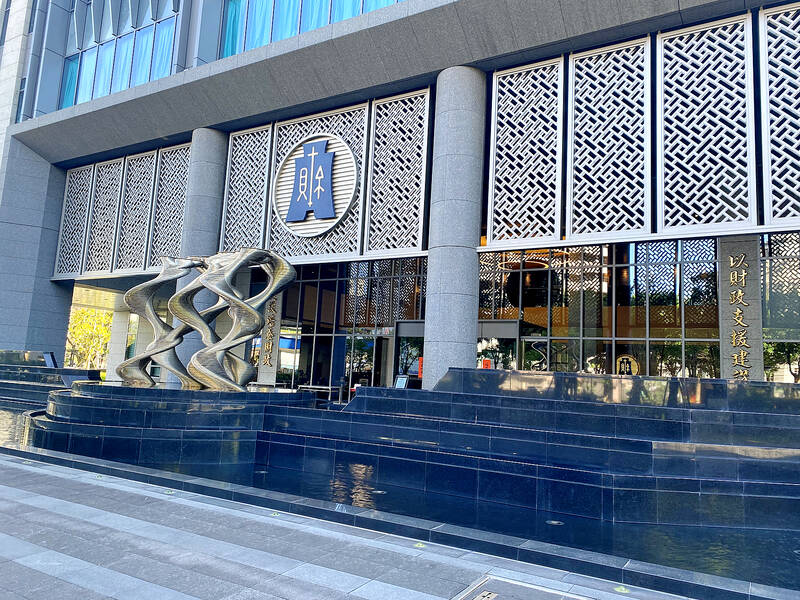Tax revenue last month declined 9 percent from a year earlier to NT$332.4 billion (US$10.31 billion), as an economic slowdown weighed on corporate and personal income taxes, although securities transaction tax continued a rebound, the Ministry of Finance said yesterday.
Corporate and personal income tax revenue shrank 28.5 percent and 3.9 percent year-on-year to NT$116.9 billion and 42.5 billion respectively, ministry statistics official Liang Kuan-hsuan (梁冠璇) told an online news briefing.
Firms are less active in setting aside tax expenses this year due to poor sales, while the Mid-Autumn Festival contributed to the delay the last month, Liang said.

Photo: Clare Cheng, Taipei Times
Lackluster corporate earnings in turn dampened cash dividends, which fell 13 percent from a year earlier, accounting for the drop in personal income, she said.
Still, personal income tax revenue in the first nine months of the year already exceeded the ministry's target for the entire year, and so did business, inheritance, stamp and house tax revenues, Liang said.
The business tax revenue last month grew 11 percent to NT$105.9 billion from a year earlier and expanded 5.9 percent in the first nine months from the same period last year to NT$469.1 billion, as local financial service providers benefited from interest rate hikes at home and abroad, Liang said.
Sales taxes last month picked up 6.3 percent annually to NT$12.9 billion, mainly aided by strong demand for imported cars, she said.
Securities transaction tax revenue last month spiked 24.5 percent year-on-year to NT$15.7 billion as daily turnover soared 27.6 percent to N$312.7 billion, ministry data showed.
Overall stock investment interest strengthened compared with a year earlier, although artificial intelligence-related plays saw significant price corrections, Liang said.
On the other hand, land value incremental tax revenue, a gauge of property market health, edged up 2 percent to NT$6.1 billion last month after the number of taxable cases rose 5.1 percent to 40,741, she said, suggesting a neutral reading of the changes.
Cumulative tax revenue amounted to NT$2.79 trillion in the first nine months, a 6.3 percent increase from the same period last year and ahead of the ministry's budget schedule by 12.3 percent.
The state coffers might collect excess tax revenue of NT$100 billion this year in the absence of major shocks, the ministry said.

UNCERTAINTY: Innolux activated a stringent supply chain management mechanism, as it did during the COVID-19 pandemic, to ensure optimal inventory levels for customers Flat-panel display makers AUO Corp (友達) and Innolux Corp (群創) yesterday said that about 12 to 20 percent of their display business is at risk of potential US tariffs and that they would relocate production or shipment destinations to mitigate the levies’ effects. US tariffs would have a direct impact of US$200 million on AUO’s revenue, company chairman Paul Peng (彭雙浪) told reporters on the sidelines of the Touch Taiwan trade show in Taipei yesterday. That would make up about 12 percent of the company’s overall revenue. To cope with the tariff uncertainty, AUO plans to allocate its production to manufacturing facilities in

Taiwan will prioritize the development of silicon photonics by taking advantage of its strength in the semiconductor industry to build another shield to protect the local economy, National Development Council (NDC) Minister Paul Liu (劉鏡清) said yesterday. Speaking at a meeting of the legislature’s Economics Committee, Liu said Taiwan already has the artificial intelligence (AI) industry as a shield, after the semiconductor industry, to safeguard the country, and is looking at new unique fields to build more economic shields. While Taiwan will further strengthen its existing shields, over the longer term, the country is determined to focus on such potential segments as

COLLABORATION: Given Taiwan’s key position in global supply chains, the US firm is discussing strategies with local partners and clients to deal with global uncertainties Advanced Micro Devices Inc (AMD) yesterday said it is meeting with local ecosystem partners, including Taiwan Semiconductor Manufacturing Co (TSMC, 台積電), to discuss strategies, including long-term manufacturing, to navigate uncertainties such as US tariffs, as Taiwan occupies an important position in global supply chains. AMD chief executive officer Lisa Su (蘇姿丰) told reporters that Taiwan is an important part of the chip designer’s ecosystem and she is discussing with partners and customers in Taiwan to forge strong collaborations on different areas during this critical period. AMD has just become the first artificial-intelligence (AI) server chip customer of TSMC to utilize its advanced

While China’s leaders use their economic and political might to fight US President Donald Trump’s trade war “to the end,” its army of social media soldiers are embarking on a more humorous campaign online. Trump’s tariff blitz has seen Washington and Beijing impose eye-watering duties on imports from the other, fanning a standoff between the economic superpowers that has sparked global recession fears and sent markets into a tailspin. Trump says his policy is a response to years of being “ripped off” by other countries and aims to bring manufacturing to the US, forcing companies to employ US workers. However, China’s online warriors